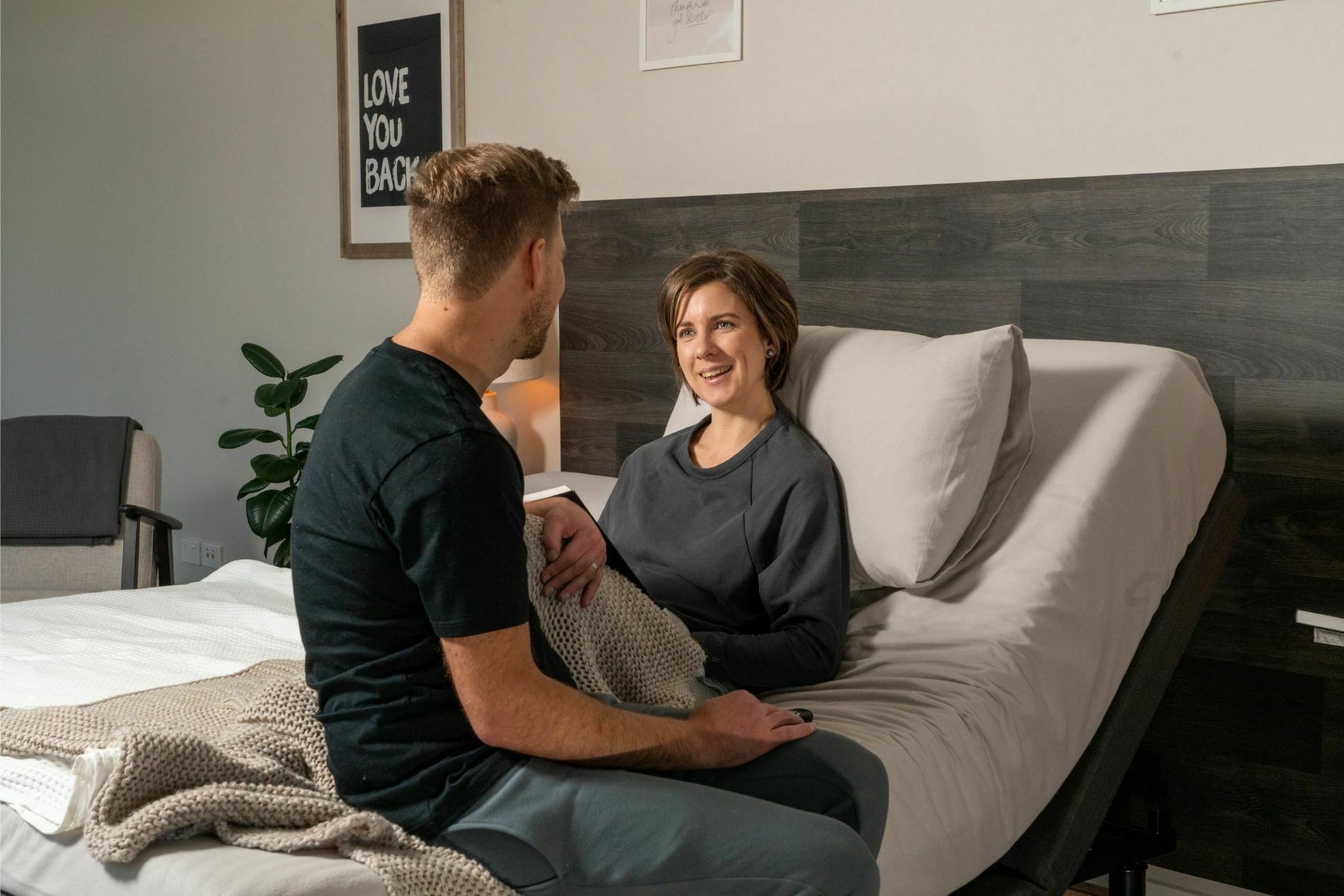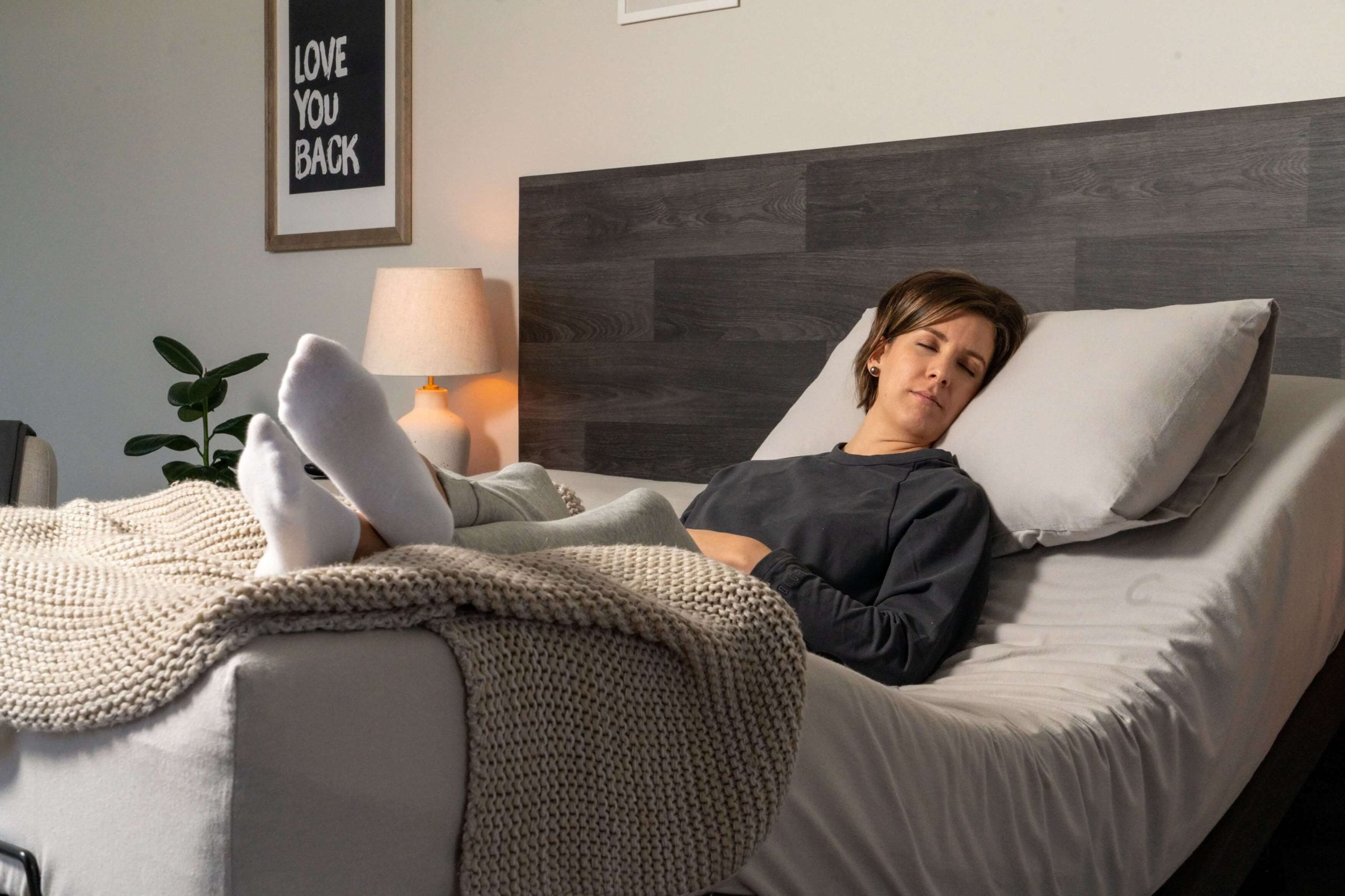
Sleep is more than just getting some shut-eye—it’s when your body and mind do their essential maintenance work to keep you happy and healthy. While we often think of sleep as a passive state, it’s actually a time when our bodies and minds are hard at work, undergoing changes that contribute to everything from improving memory to physical repair. To truly understand and appreciate the importance of sleep, let’s explore the science behind what happens when we sleep and the key factors that can help us achieve quality sleep.
The science of sleep: What happens when we sleep?
We’ve all wondered how sleep works, asking ourselves what happens? How does it happen? How do I get a good night’s sleep? To really learn how it all works, first you’ll need to get familiar with the stages of sleep and the roles they play.
The sleep cycle
The sleep cycle is a dynamic and essential process that alternates between two primary types, (NREM) Non-Rapid Eye Movement sleep and (REM) Rapid Eye Movement sleep. These stages work together in roughly 90-minute cycles throughout the night, each contributing uniquely to the functionality and effectiveness of your sleep:
Stage 1 (NREM): The light sleep
- Duration: 1-7 minutes
- What happens: Stage 1 marks the transition from wakefulness to sleep, a light sleep stage where you are most easily awakened. As you enter this stage, your body begins to relax, muscles loosen, breathing slows, and your heart rate decreases.
This stage is often characterised by brief muscle twitches known as hypnic jerks, which can be accompanied by the sensation of falling. These jerks are common and harmless, signalling the body’s shift from an active state to rest. Though short in duration, Stage 1 is crucial for easing you into the deeper stages of sleep that follow.
Stage 2 (NREM): The onset of true sleep
- Duration: 10-25 minutes per cycle
- What happens: Stage 2 is where true sleep begins. During this stage, you become less aware of your external environment as your body further relaxes. Your core body temperature drops, and your eye movements stop. Internally, this stage is vital for cognitive functions; your brain begins the process of consolidating memories and organising the day’s experiences.
It also regulates your sleep by keeping you in a light yet steady state of sleep, acting as a bridge to the deeper, more regenerative stages. Stage 2 is often the most repeated stage during the night, serving as a foundation for overall sleep.
Stage 3 (NREM): The deep sleep
- Duration: 20-40 minutes in the first cycle, decreasing in duration as the night progresses
- What happens: Stage 3, often referred to as slow wave sleep (SWS) or deep sleep, is the most restorative part of the sleep cycle. During this stage, your body enters a state of full relaxation: blood pressure drops, breathing becomes even slower, and your muscles are completely at ease. The brain produces slow, high-amplitude delta waves, which are pivotal for physical healing and growth.
This stage is where the body repairs tissues, builds muscle and bone, and boosts the immune system. It also plays a significant role in strengthening memory retention, especially in transferring information from short-term to long-term memory. As the night progresses, the amount of time spent in deep sleep decreases, with more time allocated to REM sleep.
Stage 4 (REM): The dream stage
- Duration: Initially lasts about 10 minutes, increasing up to an hour by morning
- What happens: REM sleep is the most active and intriguing stage of the sleep cycle, often referred to as the “dream stage.” During REM sleep, your brain activity ramps up, nearly reaching levels seen during wakefulness. This is the stage where most dreaming occurs, and it’s essential for emotional regulation, creativity, and problem solving.
Despite the high level of brain activity, your body remains in a state of temporary paralysis, known as REM atonia, which prevents you from physically acting out your dreams. REM sleep also plays an important role in organising and processing emotional experiences, helping you cope with daily stresses.
As the night progresses, REM stages become longer, peaking in the early morning hours. This stage is vital for maintaining mental health and ensuring you wake up feeling refreshed and mentally sharp.
Circadian rhythm
The circadian rhythm is an internal biological clock that plays a crucial role in regulating our sleep-wake cycle and orchestrating these different stages of sleep. It operates on a roughly 24-hour cycle and is influenced by various factors, including light exposure and lifestyle habits. This rhythm not only dictates when we feel alert or drowsy but also influences the timing and duration of sleep stages, such as light sleep, deep sleep, and REM (rapid eye movement) sleep.
The circadian rhythm helps us cycle through these stages in a way that promotes restorative sleep and cognitive function. Disruptions to the circadian rhythm, such as irregular sleep schedules, exposure to artificial light at night, or shift work, can lead to sleep disturbances and alter the natural progression of these sleep stages, impacting overall sleep quality. Understanding and maintaining a healthy circadian rhythm is essential for achieving a balanced sleep cycle, which is very important for overall health and well-being.
The importance of sleep for overall health
Now that we have a grasp of how sleep functions, let’s take a look at the important health benefits getting a great night’s sleep brings.
Physical health benefits
Cardiovascular health
Adequate sleep is essential for maintaining heart health. During sleep, particularly during deep sleep, your heart rate and blood pressure decrease, giving your heart a much needed rest. This reduction in cardiovascular activity helps lower the risk of developing heart disease, hypertension, and stroke.
Chronic sleep deprivation, on the other hand, has been linked to increased risk of hypertension and heart attack.
Weight management
Sleep plays a key role in regulating the hormones that control hunger and appetite. Ghrelin, the hormone that stimulates appetite, increases with sleep deprivation, while leptin, the hormone that signals satiety, decreases.
This imbalance leads to increased cravings for high-calorie, carbohydrate-rich foods, which can contribute to weight gain and obesity. Lack of sleep also affects insulin sensitivity, making it more difficult for your body to regulate blood sugar levels, which can increase the risk of developing type 2 diabetes.
Pain management
Sleep is a natural remedy for managing chronic pain. During deep sleep, the body repairs and reduces inflammation, helping to reduce the perception of pain. For individuals with conditions like chronic back pain, better sleep quality can significantly reduce pain symptoms over time.
With that being said, pain can disrupt sleep, creating a cycle where lack of sleep exacerbates pain, and pain interferes with the ability to sleep. As always, if you’re experiencing any health concerns, we recommend seeking professional medical advice.
Mental health benefits
Cognitive function
Sleep is essential for brain function, particularly during REM sleep, where the brain strengthens memory retention, processes new information, and supports learning. This stage also enhances problem solving abilities and creativity, which are critical for day-to-day function. Sleep deprivation worsens your cognitive ability, leading to difficulties in concentration, decision-making, and the ability to learn new information.
Emotional regulation
Sleep plays a big role in managing emotions. During REM sleep, the brain processes emotional experiences and helps to reduce the intensity of stressful events. This processing is key to maintaining emotional stability and mental health. Chronic sleep deprivation is strongly linked to mood disorders, including depression and anxiety, as it disrupts the brain’s ability to manage emotional responses effectively.
Memory consolidation
One of the key functions of sleep is to convert short-term memories into long-term ones. This process, known as memory consolidation, mainly occurs during deep sleep, where the brain strengthens neural connections related to the day’s experiences. This stage is critical for learning and retaining new information, making it easier to recall facts, skills, and experiences later on.
The link between sleep and chronic conditions
Getting good sleep is crucial for managing and potentially improving chronic conditions such as:
- Chronic pain: For chronic pain quality sleep helps reduce inflammation and promotes healing, which can alleviate symptoms of chronic pain, including back pain and arthritis. Snoring or sleep apnea: For individuals who suffer from snoring or sleep apnea, consistent, restorative sleep can improve breathing patterns and reduce the frequency and intensity of symptoms.
The process of getting to sleep
Before you settle in for a night of peaceful sleep, it’s important to understand how your pre-sleep habits can significantly impact the quality of your rest. To give yourself the best chance of falling asleep quickly and staying asleep throughout the night, consider these key points. By practising a better bedtime routine and creating a comfortable environment, you can set yourself up for a truly restful and restorative sleep.
- Sleep environment: Ensure your bedroom is cool, dark, and quiet. Use comfortable and supportive bedding like Letto’s range of products to help you alleviate chronic back pain, snoring and sleep apnea.
- Bedtime routine: Establish a calming pre-sleep routine, such as reading, meditating, or taking a warm bath, to signal your body it’s time to wind down.
- Nutrition: Avoid caffeine, nicotine, and heavy meals before bed; consider a light snack if you’re hungry.
- Physical activity: Engage in regular exercise, but time it appropriately to avoid overstimulation before bed.
- Stress management: Address stress through techniques such as journaling and other relaxation strategies, and seek professional help if needed to ease the mind into sleep.
- Sleep disorders: Identify and manage any underlying sleep disorders, like insomnia or sleep apnea, with the guidance of a medical professional to improve sleep quality.
How much sleep does your body need?
The amount of sleep needed for optimal health and well-being varies by age and individual needs, but most adults generally require between 7 to 9 hours of sleep per night. Children, teenagers, and younger adults typically need more sleep to support their growth and development, while older adults may find that their sleep needs decrease slightly.
Quality is just as important as quantity; consistent, uninterrupted sleep allows the body to progress through the various stages of sleep, which are crucial for physical restoration, cognitive function, and emotional well-being. Ultimately, the right amount of sleep is one that leaves you feeling refreshed, alert, and ready to take on the day, without feeling groggy or fatigued. Understanding your own sleep needs and establishing a consistent sleep routine can help make sure you’re getting enough sleep to support your overall health.

Embrace restful nights: start your journey to better sleep
Are you ready to experience the full benefits of a good night’s sleep? Prioritising your sleep quality can make a significant difference in how you feel each day, and by starting to consider the things we’ve covered in this article, you’ll be well on your way to improve your sleep. If you’re ready to take your quality of sleep to the next level, it might be time to consider upgrading to a more supportive bed, such as a Letto bed. Our Italian-designed, OEKO-TEX® certified electric adjustable beds are thoughtfully crafted to provide a good night’s sleep, and alleviate issues like chronic pain, snoring and heartburn.
If you’re interested in learning more about what you can do to improve your sleep, explore our guide on how to get better sleep. Start your journey to a better night’s sleep now, and discover the small changes that can make a big difference.
